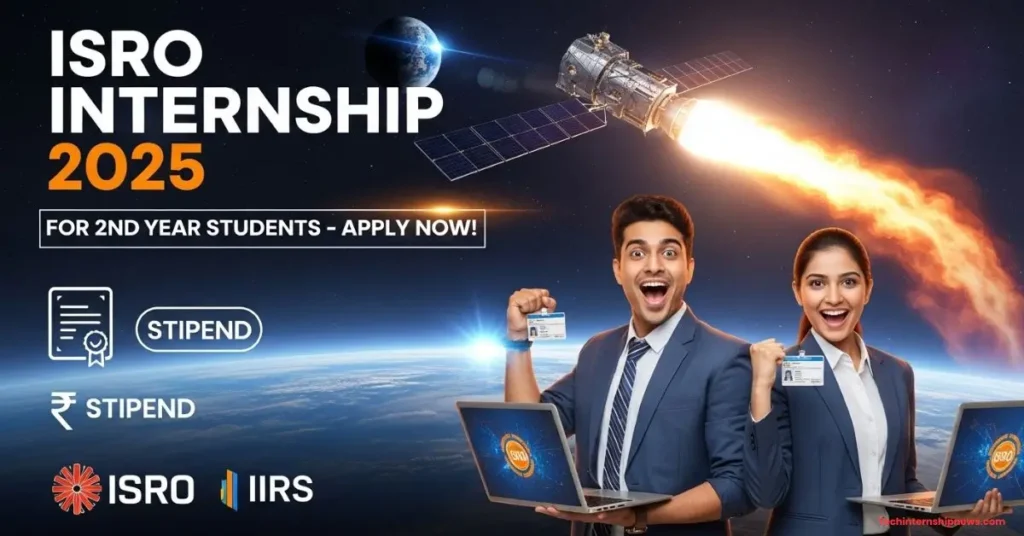Dreaming of an internship at ISRO as a 2nd year engineering or science student? You’re not alone. The Indian Space Research Organisation and its specialized arm, the Indian Institute of Remote Sensing (IIRS), represent the peak of scientific innovation in India. Every year, thousands of students feel a mix of excitement and confusion about how to land this prestigious internship.
This guide is for you if you’re in your 2nd year of engineering, science, or tech and want the real facts about ISRO and IIRS internships—especially project-based roles. I’ll break down eligibility, the application process, what the internship is really like, how you get your certificate, and the truth about the stipend. Expect simple, practical steps and honest answers.
Understanding ISRO and IIRS Internships for 2nd Year Students
ISRO is India’s national space agency. It builds satellites, launches rockets, and drives the country’s space missions. The Indian Institute of Remote Sensing (IIRS) is a unique part of ISRO focused on satellite data, remote sensing, and GIS. Both ISRO and IIRS offer internships to help students gain hands-on project experience in space science, technology, and engineering.

Think of ISRO as the “mothership” for space, and IIRS as a specialist lab focused on earth observation and data analysis. Both let you work on real projects that have direct relevance to India’s space program.
Main Types of ISRO & IIRS Internships
- General Internship: Short-term training, sometimes observational, to understand ISRO’s work culture.
- Project Trainee Scheme: Real project-based work, usually focused on research and development, remote sensing, or satellite applications. This is where you’ll learn the most.
A project-based internship at IIRS or ISRO isn’t just about adding a big name to your resume—it’s about learning how real space missions are planned and run. For more on the types of internships, see the official ISRO Internship & Student Project Trainee page.
Eligibility Criteria & Who Can Apply
Not every student is eligible. Here’s what you need as a 2nd-year applicant:
- Indian citizenship is mandatory.
- Minimum 60% marks (or CGPA 6.32/10) in your current course.
- You must be enrolled in a recognized institute (university or college in India).
- Branches accepted: Engineering (ECE, CS, IT, EE, Civil, etc.), Science, and select technology streams.
- Year of study: IIRS and ISRO usually prefer students in their pre-final or final year, but some centers accept 2nd-year students for summer training or short-term projects, especially if you have a strong academic record and a clear project idea.
For the latest details, always check the IIRS external student internship page.
Internship Duration, Timing, and Key Dates
- Duration: Minimum 45 days, up to one year for some projects.
- Main application cycles:
- August–October: For internships starting in winter or the next summer.
- March: For summer internships.
- When should you apply as a 2nd year? Apply early in the cycle (August–October) if you want to secure a spot for your summer break after 2nd year. Many students start preparing in the spring semester itself.
A Step-by-Step Guide to the IIRS/ISRO Application Process
Applying to ISRO or IIRS is a little different from regular campus internships. Here’s how you make it happen:
- Choose your center and project interest. Research the ISRO center or IIRS division whose work aligns with your interests. Have a project topic or research area in mind.
- Prepare your documents. You’ll need your marksheets, a No Objection Certificate (NOC) from your college, a resume, passport-sized photos, and a short project proposal or statement of purpose.
- Apply through the official online portal or send your application via email/post (as directed).
- Wait for shortlisting and any follow-up interviews or technical discussions.
- Get approval and reporting instructions if selected.
For more details on each step, the official ISRO Student Project Trainee guidelines provide up-to-date information.
Application Documents Checklist
- Recent passport-size photos (2–4, as specified)
- Marksheet of last completed semester/year
- NOC from your college’s Head of Department or Principal
- Updated resume/CV
- Project proposal or Statement of Purpose (1–2 pages)
- College ID card copy
- Letter of introduction from college (sometimes requested)
How Selection Works: What IIRS & ISRO Look For
Selection isn’t random. ISRO and IIRS focus on:
- Academic scores: Consistent marks above 60%.
- Project idea relevance: You must show why your proposed project matches the center’s work.
- Subject background: They want students with the right technical foundation (e.g., programming for data science projects, electronics for hardware).
- Faculty/project mentor availability: Sometimes, your selection depends on whether a scientist/mentor has room to guide you.
Tips for a strong application:
- Write a clear, concise project proposal.
- Show your passion for space/remote sensing in your Statement of Purpose.
- Highlight any previous project work, online courses, or technical skills.
The Talentd.in guide to IIRS-ISRO internships has more tips and recent updates.
What to Expect: Internship Experience, Certificate & Stipend Facts
At ISRO or IIRS, you won’t just watch scientists work—you’ll join real teams and contribute to ongoing research or engineering projects. Typical tasks for interns include:
- Data analysis on satellite imagery
- Building basic geospatial tools
- Supporting ongoing research in remote sensing or GIS
- Documentation and report writing
- Presenting your findings to scientists and mentors
You’ll work under the guidance of experienced scientists. The projects are hands-on, and you’ll learn tools and skills that go far beyond textbooks.
No Stipend – But Is It Worth It?
Let’s be honest—ISRO and IIRS internships don’t offer a stipend or paid accommodation. For most students, this means you’ll cover your own expenses if you need to relocate.
But here’s why it’s still worth it:
- Hands-on experience: You’ll work with real data and tools used on national projects.
- Mentorship: Learn directly from experts in space science and remote sensing.
- Resume boost: ISRO/IIRS on your CV stands out to future employers and universities.
- Networking: Build professional connections that can help with jobs or higher studies.
For more details on internship terms, see the IIRS external student internship page.
Certificate: What You’ll Get and How to Earn It
On successfully finishing your project, submitting your report, and making your final presentation, you’ll receive an official certificate from IIRS or the relevant ISRO center. This certificate:
- Acts as proof of your hands-on project experience
- Can be included in your resume or higher studies applications
- Shows future employers you’ve worked at India’s top space research organization
Certificates are usually given at the end of your internship, once you’ve met all project requirements.
Conclusion
ISRO and IIRS internships are a unique chance for 2nd year students with a science or tech background to work on real-world space projects. If you meet the eligibility criteria, prepare your documents early, and show your passion for space science, you stand a solid chance.
Disclaimer: This guide is for informational purposes. ISRO/IIRS policies may change. Always verify details through official ISRO/IIRS sources before applying. No financial advice is given. For exact eligibility and deadlines, visit the official ISRO or IIRS website.















